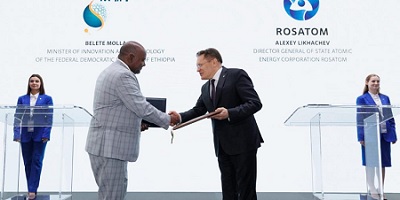
Ethiopia's Commitment to Nuclear Science for Peaceful Healthcare
The Rays of Hope Forum 2025 recently commenced in Addis Ababa, marking a significant milestone in the global effort to enhance cancer care in low- and middle-income countries. The event was opened by Deputy Prime Minister Temesgen Tiruneh, who emphasized Ethiopia’s dedication to utilizing nuclear science for peaceful and safe applications, particularly in healthcare.
During the forum, the International Atomic Energy Agency (IAEA) celebrated the third anniversary of its Rays of Hope initiative. This global program aims to expand access to life-saving cancer care in regions where resources are limited. The forum serves as a platform to evaluate progress, strengthen partnerships, and accelerate efforts to improve cancer care infrastructure across Africa and beyond.
Progress in Cancer Care and Radiotherapy
In his keynote address, Deputy Prime Minister Temesgen highlighted Ethiopia’s advancements in expanding cancer care and radiotherapy services nationwide. He stated that the country is bringing essential technologies closer to communities and reinforcing regulatory systems to ensure the safe use of radiation. "Our investments in nuclear science are strictly for peaceful and developmental purposes, focusing on early detection and treatment of diseases," he said. "Through these efforts, we aim to save lives and promote public health."
Temesgen also acknowledged Ethiopia’s broader health achievements over the past three decades. He praised the Health Extension Program, which has trained tens of thousands of community health workers, significantly extending healthcare access to every corner of the country. "We have made healthcare a right, not a privilege," he added. However, he emphasized that this is not the end of the journey but rather a turning point. "The burden of disease is shifting, and we must adapt accordingly."
Environmental and Health Synergies
The Deputy Prime Minister further noted that Ethiopia’s Green Legacy Initiative is addressing environmental challenges while contributing to public health. By promoting sustainable well-being for both people and the planet, the initiative aligns with the country’s broader goals of improving quality of life.
Addressing the Burden of Non-Communicable Diseases
State Minister of Health Dereje Duguma (MD) provided critical insights into the current health landscape in Ethiopia. He stated that over 51% of the country’s disease burden comes from non-communicable diseases (NCDs) and injuries. Of these, more than 10% are attributed to cancer. "Every year, Ethiopia records over 80,000 new cancer cases and around 55,000 related deaths," he said.
Dereje identified breast, cervical, and colorectal cancers as the most frequently diagnosed types in the country. He stressed the importance of early detection, access to treatment, and increased public awareness to reduce the cancer burden. "These measures are crucial in our fight against the growing prevalence of cancer," he added.
High-Level Participation and Global Collaboration
The opening session of the Rays of Hope Forum 2025 featured several high-level dignitaries, including IAEA Director General Rafael Mariano Grossi, Health Minister Mekdes Daba (MD), Deputy Prime Minister Temesgen Tiruneh, African Union Chief of Staff Mohamed El-Amine Souef, as well as various ministers, ambassadors, and international partners.
This gathering underscores the importance of global collaboration in tackling cancer and other health challenges. The forum provides an opportunity to assess progress, strengthen partnerships, and accelerate efforts to improve cancer care infrastructure and services across Africa and beyond.
A Call to Action
As the Rays of Hope Forum 2025 continues, it serves as a reminder of the collective responsibility to address health disparities and promote equitable access to medical advancements. Ethiopia’s commitment to using nuclear science for peaceful purposes highlights the potential of technology to transform healthcare and save lives. With continued investment, innovation, and international cooperation, the future of cancer care in Ethiopia and beyond looks increasingly promising.
Post a Comment